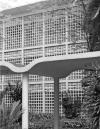Resumen
En este trabajo se estudia la obra de Rino Levi, quien perteneció a la generación de arquitectos que implanta ydesarrolla la arquitectura moderna en Brasil. El análisis está centrado en el estudio del proceso de diseño y buscaidentificar procedimientos generales considerando siempre la interacción entre la producción del arquitecto modernoy el medio en que actúa. Los matices especiales que presenta la modernidad frente a la dicotomía racionalidady contingencia, normativo y especial, etc., indicada por autores como Alan Colquhoun y Carlos Eduardo Comas, estema central en esta investigación. Primero se hace una lectura de la obra de Levi de los primeros años teniendoen cuenta las influencias y el contexto urbano y cultural en que trabaja el arquitecto, el trabajo práctico y las consecuentesreflexiones teóricas. Luego, se analiza la obra de la madurez profesional desde los aspectos cualitativosdel espacio urbano, desde el centro de la gran metrópoli hasta los grandes solares ubicados hacia la periferia. Lainterpretación de la obra de Levi desde un hecho contingente tan importante como el lugar urbano, devela las diversasadaptaciones que tal arquitectura podía asumir sin dejar de mantener identificable, en su base y estructura,el “esquema” modernoLa revista Apuntes se encuentra registrada bajo la licencia Creative Commons Reconocimiento 4.0 Internacional. Por lo tanto, esta obra se puede reproducir, distribuir y comunicar públicamente en formato digital, siempre que se reconozca el nombre de los autores y a la Pontificia Universidad Javeriana. Se permite citar, adaptar, transformar, autoarchivar, republicar y crear a partir del material, para cualquier finalidad (incluso comercial), siempre que se reconozca adecuadamente la autoría, se proporcione un enlace a la obra original y se indique si se han realizado cambios. La Pontificia Universidad Javeriana no retiene los derechos sobre las obras publicadas y los contenidos son responsabilidad exclusiva de los autores, quienes conservan sus derechos morales, intelectuales, de privacidad y publicidad.
El aval sobre la intervención de la obra (revisión, corrección de estilo, traducción, diagramación) y su posterior divulgación se otorga mediante una licencia de uso y no a través de una cesión de derechos, lo que representa que la revista y la Pontificia Universidad Javeriana se eximen de cualquier responsabilidad que se pueda derivar de una mala práctica ética por parte de los autores. En consecuencia de la protección brindada por la licencia de uso, la revista no se encuentra en la obligación de publicar retractaciones o modificar la información ya publicada, a no ser que la errata surja del proceso de gestión editorial. La publicación de contenidos en esta revista no representa regalías para los contribuyentes.


